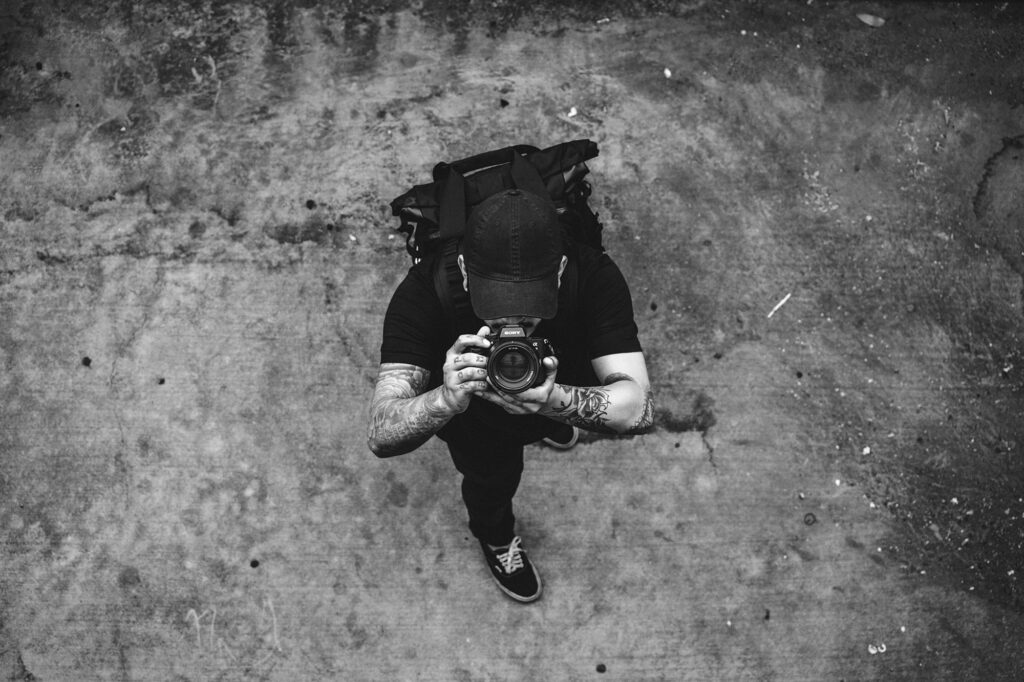Some words get repeated so often that their meaning feels obvious. But the more we use them, the more important it becomes to pause and define them; especially if we want to build deeper conversations. Since we’re going to talk a lot about photography and videography in this blog, it’s worth starting with a foundational question: What is photography, and who is a photographer? Let’s dig into these definitions and see why they matter.
TL;DR
- Photography literally means “drawing with light”, based on its Greek roots.
- Anyone who takes a photo is technically doing photography, but that doesn’t automatically make them a photographer.
- A “photographer” can be defined as someone who either earns money through photography or consistently practices it with intent.
- These definitions matter: they shape how we view the art, the profession, and who belongs in the creative community.
What Does Photography Mean?
For most people, “photography” simply means the act of taking pictures, often in high volume. But if we go back to the root, the word’s origin reveals something deeper.
“Photography” comes from two Greek words: photo (light) and graphy (drawing or writing). Combined, it means drawing with light.
To understand why that matters, let’s take a quick look at how early cameras worked.
The First Cameras: A Bit of History
Early cameras were essentially sealed black boxes with a small hole on one side to let the light in. Inside, on the opposite side, was a surface coated with a light-sensitive material. When light entered through the hole, it hit this surface and created an image.
So when we say photography is “drawing with light”, it’s not just poetic, it’s literally true. And while today’s cameras are more complex, the core mechanism hasn’t changed: we’re still using light to create images.
Who Counts as a Photographer?
In the simplest terms: anyone who takes a photo is a photographer. If you use light to create an image, you’ve practiced photography.
But what if we’re referring to someone as a photographer, without any qualifiers or specific context?
In that case, my working definition is:
A photographer is someone who practices photography professionally or seriously, often earning an income through it.
This doesn’t mean amateur photographers don’t count. It simply acknowledges the distinction between photography as a skill or art form, and photography as a career or identity.
What About Amateur Photographers?
When we add a label like “amateur” to “photographer”, we clarify that the person practices photography without financial motives. In this context, photography is art, not occupation.
Ready to take actual steps toward becoming a photographer? Start with our beginner guide: How to Become a Photographer.
Why These Definitions Matter
If we accept these definitions:
- Anyone can take photos, but not everyone is necessarily a “photographer.”
- Who gets considered a “real photographer” often depends on the audience or client.
This has a few important implications:
1. Don’t Be Afraid to Use the Word “Photography”
Photography is one of the most accessible art forms today. You can start with just a smartphone. So go ahead, call your creative practice what it is.
2. Don’t Gatekeep the Term “Photographer”
Some people love calling themselves photographers but dismiss others with comments like:
- “You’re not a photographer if you shoot on auto.”
- “That kind of photo doesn’t count.”
- “If you don’t own XYZ gear, you’re not a real photographer.”
This kind of thinking is harmful. It creates division in a community that should be open and inclusive.
3. Respect All Types of Creators
You’ve probably heard people say things like, “That influencer isn’t even a real photographer”, even though their income comes from photography. This kind of gatekeeping:
- Shuts down meaningful conversations about what makes a good photo
- Builds unnecessary distance between casual creators and professionals
4. It’s Not Just About Technical Skill
Being a photographer isn’t only about mastering the craft. While understanding lighting, composition and editing is essential, you can’t always measure artistic vision or creative intent through technical ability alone.
5. A Note for Future Posts
Whenever I use the words “photography” or “photographer” on this blog, I’ll be using the broader definitions we’ve discussed here, unless stated otherwise.
Last Words
Photography is for everyone. Whether you’re a hobbyist with a phone or a full-time professional with a studio, you have a place in the creative world.
Let’s keep that space inclusive, curious and evolving. And let’s start by agreeing on what we mean when we say “photographer.”
Want more discussions like this? Follow me on your favorite social media (handle everywhere: @MediabyHamed / search for Hamed Media) or subscribe to my newsletter for more practical tips and guides like this.
FAQ
What is the simplest definition of photography?
Photography is the art and practice of capturing light using a camera to create visual images.
Do I need a professional camera to be a photographer?
No, you can be a photographer using any camera -including smartphones- what matters is the intention and approach behind the image.
Is photography considered art or science?
Photography blends both: the science of optics and exposure, and the artistic choices of composition, timing, and emotion.



